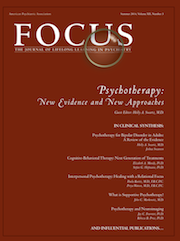… careful analysis shows that they focus on different aspects of medical care and have, in fact, little in common. Evidence-based medicine is a rather young concept that entered the scientific literature in the early 1990s. It has basically a positivistic, biomedical perspective. Its focus is on offering clinicians the best available evidence about the most adequate treatment for their patients, considering medicine merely as a cognitive-rational enterprise. In this approach, the uniqueness of patients, their individual needs and preferences, and their emotional status are easily neglected as relevant factors in decision-making. Patient-centered medicine, although not a new phenomenon, has recently attracted renewed attention. It has basically a humanistic, biopsychosocial perspective, combining ethical values on “the ideal physician,” with psychotherapeutic theories on facilitating patients’ disclosure of real worries, and negotiation theories on decision making. It puts a strong focus on patient participation in clinical decision making by taking into account the patients’ perspective, and tuning medical care to the patients’ needs and preferences. However, in this approach the ideological base is better developed than its evidence base. In modern medicine both paradigms are highly relevant, but yet seem to belong to different worlds (
3, p. 19).
Clinical Vignette
Mr. Martely stood, somewhat hunched as if attempting to remain inconspicuous despite his notable height. He had not been to a psychiatrist before, and he was clearly uncomfortable.
“Hello, Mr. Martely,” Dr. Freeman smiled, shaking his hand as he entered the office. Mr. Martely cautiously inspected the office prior to sitting down. Dr. Freeman, noting Mr. Martely’s discomfort, began discussing the components of the evaluation—they would talk about what brought him to the psychiatrist, review his history, and determine how she might be most helpful. Mr. Martely’s stiff shoulders relaxed slightly as Dr. Freeman spoke.
“So,” finished Dr. Freeman. “What brings you to see me today?”
Mr. Martely stared out the window, saying nothing. Dr. Freeman respectfully waited. After a long silence, Mr. Martely blurted out what was on his mind. “You are probably going to think I’m crazy, so I don’t want to say. But, in Haiti, where I grew up, we believe in Vodou. I know that Jean-Paul has put a curse on me. I went to see Alourdes. She is a Vodou healer, you know. She is really good. She understands these things, and she agreed. She gave me a good luck bath, and a powerful charm, and I was doing good. But, then it came back.”
“What came back?” inquired Dr. Freeman, leaning forward attentively in her chair.
“The bad luck. You see, I lost another job. They say it’s my temper. But it’s not part of me. It just comes. That’s why I know Jean-Paul put a curse on me.”
After hearing more of his life story, Dr. Freeman sat, contemplating options. She did not know much about Haitian Vodou beliefs. Mr. Martely’s life was replete with traumatic losses, followed by emotional distress and angry outbursts. Jean-Paul, the person from his childhood whom he identified as the nemesis that had placed the curse, had been a friend in high school. They had both fallen in love with the same girl. Mr. Martely had told the girl some of Jean-Paul’s history and how he “wasn’t a trustworthy guy.” The claims were basically true, but Jean-Paul was enraged, and called Mr. Martely a lying traitor. It is then that Mr. Martely felt that Jean-Paul had put a curse on him. He had lost the girl to Jean-Paul and suffered “bad luck” ever since. He had lost multiple jobs, was at risk of being evicted from his apartment, and had intermittent suicidal thoughts.
“I don’t really believe in psychiatrists,” Mr. Martely confessed. “I’m afraid you will think I’m crazy and put me away or drug me up. But I lost another job because of my temper, and I don’t know what else to do. Please, just tell me what to do or give me something powerful to help!”
Dr. Freeman gazed empathically at Mr. Martely. She was touched by his honesty, his pain, and his convictions. How should she respond? His cultural expectation was for a “cure”—some treatment that would break this bad luck curse. The evidence suggested a major depressive disorder, possibly with psychotic features. There was a component of chronic PTSD and impulse control difficulties, as well. He smoked marijuana when he could afford it—that also needed to be considered. Evidence-based treatment would point to antidepressants, possibly an antipsychotic medication, and cognitive-behavioral therapy. Patient-centered treatment would suggest engagement of Mr. Martely in formulating his own treatment plan. Did that fit with his cultural beliefs? Systems-based care models would suggest that Mr. Martely needed assistance with housing, finances, and perhaps job coaching. As all of these thoughts swirled through Dr. Freeman’s head, she took a piece of paper.
“Hmm… You have had bad luck,” she mused. “And you do have problems that need to be sorted out. The first one is safety and we can list the others that you think are most urgent.”
Dr. Freeman and Mr. Martely set out a short-term plan. As he was leaving, Mr. Martely shook Dr. Freeman’s hand. “You should think about becoming a Vodou healer. I think you might have the ‘gift of eyes,’” he said, flashing a smile as he departed.

